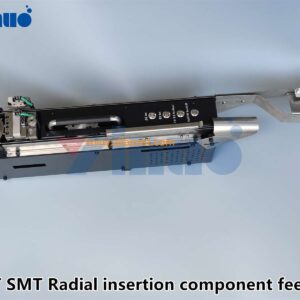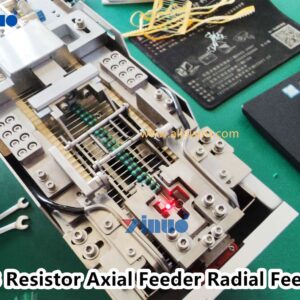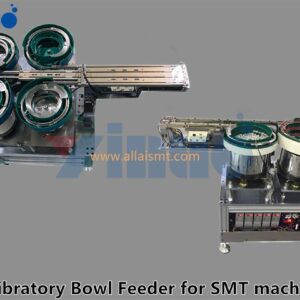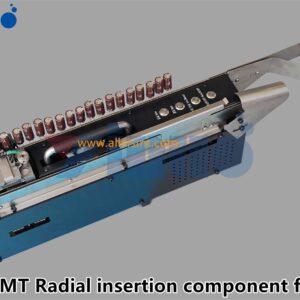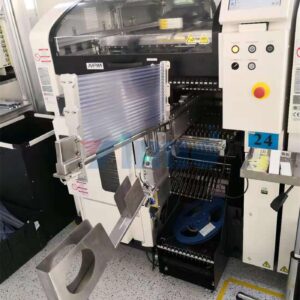1) Feeder Dimension (L*W*H): 550*110*130mm
2) Tape Component dimension: 2*2*3-15*15*30mm
3). Distance Transport Hole: 12.7mm / 15mm
4). Distance Transport hole to cutting edge: 11mm
5). Tape Component Height: Max. 30mm
6). Component Body Diameter: Max. 15mm 7). Speed: 0.8 Sec./pcs

Radial Feeders
What Are Radial Components?
Radial components are electronic components with leads extending radially outward from the body. Common examples include:
- Radial capacitors (e.g., electrolytic capacitors).
- Radial resistors.
- LEDs.
- Diodes.
- Other through-hole components with radial lead configurations.
Key Features of SMT Radial Feeders:
- Radial Component Feeding:
- Specifically designed to handle radial-leaded components.
- Components are typically supplied in tape-and-reel or ammo pack packaging.
- Automated Feeding:
- The feeder advances the tape or ammo pack to position the next component for the pick-and-place machine.
- Ensures smooth and continuous feeding of components.
- Lead Cutting and Forming:
- The feeder includes mechanisms to cut the leads of the radial components to the desired length.
- Lead forming ensures the component fits perfectly into the PCB’s through-holes.
- High-Speed Operation:
- Designed to keep up with the high-speed demands of modern pick-and-place machines.
- Ensures a steady supply of components to avoid production delays.
- Precision Placement:
- Ensures accurate alignment and positioning of components for the pick-and-place head.
- Reduces errors and improves assembly quality.
- Compatibility:
- Compatible with various pick-and-place machines from manufacturers like Panasonic, Universal Instruments, Juki, and others.
- Can handle a wide range of radial component sizes and lead pitches.
- Durable Design:
- Built with robust materials to withstand the demands of high-volume production environments.
- Designed for long-term reliability and minimal maintenance.
Applications of SMT Radial Feeders:
- Through-Hole Technology (THT):
- Used in assembly lines where through-hole components are required for mechanical strength or specific electrical properties.
- Hybrid Assembly Lines:
- Combines SMT and THT processes for mixed-technology PCBs.
- Consumer Electronics:
- Commonly used in products like televisions, radios, and home appliances.
- Automotive Electronics:
- Ideal for assembling PCBs in automotive applications where through-hole components are preferred for durability.
- Industrial Equipment:
- Used in PCBs for industrial control systems, power supplies, and other applications.
Advantages of SMT Radial Feeders:
- Automation:
- Reduces manual handling of radial components, increasing production efficiency.
- Consistency:
- Ensures uniform lead cutting, forming, and placement, improving assembly quality.
- High Throughput:
- Capable of feeding and placing components at high speeds, keeping up with modern production demands.
- Flexibility:
- Can handle a variety of radial components with different sizes and lead configurations.
- Cost-Effective:
- Reduces labor costs and assembly time for high-volume production.
How It Works:
- Component Loading:
- Radial components are loaded into the feeder in tape-and-reel or ammo pack form.
- Feeding:
- The feeder advances the tape or ammo pack to position the next component for processing.
- Lead Cutting and Forming:
- The feeder cuts the leads to the desired length and forms them to match the PCB’s hole spacing.
- Pick-and-Place:
- The pick-and-place machine picks up the component and inserts it into the PCB.
- Lead Clinching:
- After insertion, the leads are clinched (bent) on the underside of the PCB to secure the component in place.
Limitations:
- Initial Cost:
- Radial feeders and insertion machines can be expensive to purchase and set up.
- Component Packaging:
- Requires components to be supplied in tape-and-reel or ammo pack formats.
- Limited to Radial Components:
- Cannot handle axial-leaded components or SMT components.
Leading Manufacturers of SMT Radial Feeders:
- Panasonic:
- Offers high-speed radial insertion machines and feeders.
- Universal Instruments:
- Known for versatile radial insertion systems.
- Juki:
- Provides solutions for both SMT and THT assembly.
- Fuji:
- Advanced automation for PCB assembly, including radial feeders.
Conclusion:
An SMT Radial Feeder is an essential tool for automating the placement of radial-leaded components in PCB assembly. Its ability to handle lead cutting, forming, and precise placement makes it a valuable addition to any production line, especially for hybrid or through-hole assembly processes. If you need more details about specific models, configurations, or integration with your pick-and-place machine, feel free to ask!










